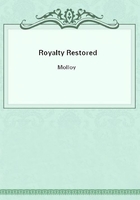
第56章 CHAPTER X.(2)
Withal his majesty's satisfaction in Lord Rochester's wit was not always to be counted upon, as it proved. For it came to pass one night at the close of a royal supper, during which the earl had drunk deep, that with great goodwill to afford the king diversion, he handed his majesty what he believed was a satire on a courtier, more remarkable for its humour than its decency.
Whereon Charles, with anticipation of much delight, opened the folded page, when he was surprised to see, not a copy of verses, but an unflattering deion of himself, which ran as follows:
"Here lies our mutton-eating king, Whose word no man relies on;Who never said a foolish thing, And never did a wise one."Now the king, though the best tempered of men and most lenient of masters, was naturally wrathful at this verbal character: the more so because recognising its faithfulness at a glance. He therefore upbraided Rochester with ingratitude, and banished him from the court.
Nothing dismayed, my lord retired into the country; but in a short time, growing weary of pastoral solitude which gave him an appetite for adventure it could not wholly supply, he returned privately to town, and assuming a disguise, took up his residence in the city. Here exercising his characteristic tact, and great capacity for pleasing, he speedily made friends with wealthy merchants and worthy aldermen, who subsequently invited him to their hospitable tables, and introduced him to their gracious ladies.
And as his conversation had not failed to delight the husbands, neither were his charms unsuccessful in affording satisfaction to their wives. To the one he railed against the impotence of the king's ministers, to the other he declaimed upon the wickedness of his majesty's mistresses; and to both his denunciations were equally sincere and acceptable. But his bitterest words were reserved for such courtiers as Rochester, Buckingham, and Killigrew, whose dissipated lives were the scandal of all honest men, the terror of all virtuous women: insolent fellows, moreover, who had the impudence to boast that city ladies were not so faithful to their husbands as was generally supposed, and, moreover, the boldness to assert that they painted. Indeed, he marvelled much, that since such men were frequenters of Whitehall, sacred fire from heaven had not long since descended and consumed the royal palace to ashes. Such virtuous sentiments as these, expressed by so gallant a man, made him acceptable in many homes: and the result was he speedily became surfeited by banquets, suppers, and other hospitalities, to which the excellent but credulous citizens bade him heartily welcome.
He therefore disappeared from their midst one day as suddenly and unaccountably as he had come amongst them. He did not, however, take himself afar, but donning a new disguise, retreated to a more distant part of the city: for an idea had occurred to him which he determined speedily to put in practice. This was to assume the character and bearing of a sage astrologer and learned physician, at once capable of reading the past, and laying bare the future of all who consulted him; also of healing diseases of and preventing mishaps to such as visited him. Accordingly, having taken lodgings in Tower Street, at a goldsmith's house, situated next the Black Swan, he prepared himself for practice, adopted the title of doctor, the name of Alexander Bendo, and issued bills headed by the royal arms, containing the most remarkable and impudent manifesto perhaps ever set forth by any impostor.
Copies of this may yet be seen in early editions of his works.
It was addressed to all gentlemen, ladies, and others, whether of the city, town, or country, to whom Alexander Bendo wished health and prosperity. He had come amongst them because the great metropolis of England had ever been infested by numerous quacks, whose arrogant confidence, backed by their ignorance, had enabled them to impose on the public; either by premeditated cheats in physic, chymical and galenic, in astrology, physiognomy, palmistry, mathematics, alchymy, and even government itself. Of which latter he did not propose to discourse, or meddle with, since it in no way belonged to his trade or vocation, which he thanked God he found much more safe, equally honest, and more profitable. But he, Alexander Bendo, had with unswerving faithfulness and untiring assiduity for years courted the arts and sciences, and had learned dark secrets and received signal favours from them. He was therefore prepared to take part against unlearned wretches, and arrant quacks, whose impudent addresses and saucy pretences had brought scandal upon sage and learned men.
However, in a wicked world like this, where virtue was so exactly counterfeited, and hypocrisy was generally successful, it would be hard for him, a stranger, to escape censure. But indeed he would submit to be considered a mountebank if he were discovered to be one. Having made which statement, he proceeded to draw an ingenious comparison between a mountebank and a politician, suitable to all ages and dimes, but especially to this century and country. Both, he intimated, are fain to supply the lack of higher abilities to which they pretend, with craft; and attract attention by undertaking strange things which can never be performed. By both the people are pleased and deluded; the expectation of good in the future drawing their eyes from the certainty of evil in the present.